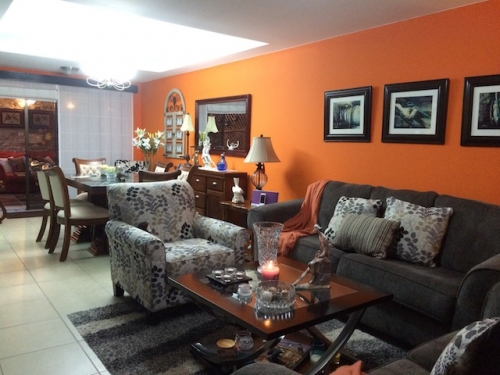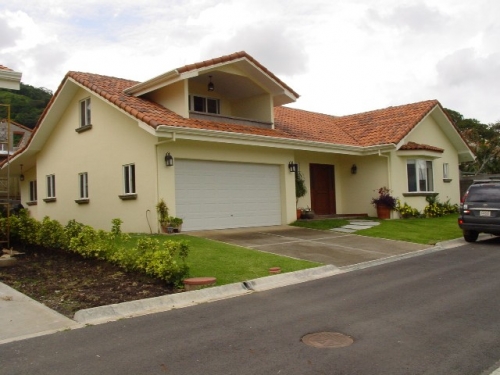Costa Rica Guide
Costa Rica Real Estate
List your property today!
Inclusion of real estate listings at Costa Rica Guide is
absolutely free of charge.
Featured Properties
Costa Rica Guide - Costa Rica Real Estate
The best (and worst) destinations for women worldwide
By Jessica Labrencis and RaeJean Stokes, Staff
SmarterTravel.com
July 27, 2006
As avid travelers, it's hard for either of us to say which countries are "good" or "bad" for women to visit. We don't want to give any one place an advantage over the next, since so much of traveling is what you put into it. For every horror story, there's one of jubilation and acceptance, and for every cab ride from hell, there's a tale of someone being welcomed home for an authentic local meal.
As a starting place for your trip planning, we've compiled two lists of destinations worldwide. In the first, Jessica Labrencis outlines five places that have a reputation for being women-friendly, while in the second, RaeJean Stokes looks at five regions where women should use extra caution. This is by no means a finite list, as terrible things can happen in safe places all over the world, and vice versa.
You can also ensure a good experience wherever you travel by arming yourself with knowledge. Learn essential phrases in the local language, read about the country's culture and religion, and watch how local women behave. And, most importantly, exercise common sense whether you're in a city or in the countryside, and even when you're in a so-called "safe" destination. For more safety tips, read Contributing Editor Christine Sarkis' feature Ten tips for women traveling alone.
Women-friendly destinations, compiled by Jessica Labrencis
In every part of the world, there are cities and countries that are safe for women to visit. In compiling a list of destinations, I spoke with several women's travel experts about their favorite places, and spotlight some of their recommendations here. Although the destinations I detail are generally considered safe, remember that there are risks wherever you go. Even when you're in a "safe" place, it's important not to let your guard down and always use common sense as you're sightseeing, shopping and dining.
Amsterdam
Most cities in Western Europe are considered safe for women to visit, either alone or with companions. Public transportation is generally safe, English is widely spoken, and European women have many of the same rights as American women. However, the same cities and countries kept coming up in my discussions with women travelers, including Amsterdam.
Evelyn Hannon, editor of Journeywoman.com, a comprehensive online resource for women travelers, says "From experience, I suggest Amsterdam ... English is spoken everywhere. The Dutch are completely pragmatic and believe that women should be independent. I seldom experience male harassment in that city." Phyllis Stoller, president of Women's Travel Club, a tour provider that organizes group trips, agrees with Hannon's assessment and remembers that she felt very comfortable in Amsterdam. Stoller says, "the Dutch are the most angelic people in the world. [Amsterdam] is a very friendly city where everybody speaks English."
SmarterTravel.com Editorial Assistant Kate Hamman took a month-long trip to Europe in the fall of 2005 that included three days in Amsterdam. It defied her dubious expectation of a city that revolved around sex and drugs. Hamman says, "I thought I might be harassed, but I actually found it to be an excellent place to wander around alone ... I wouldn't recommend wandering around the Red Light District alone at night, but there's so many great areas that most people overlook."
Ireland
Ireland is another destination that came up again and again in my conversations about safe destinations for women. It is known for its friendly people, beautiful countryside, and pubs that keep the Guinness flowing. When asked about women-friendly countries, travel expert Pauline Frommer says, "Ireland, absolutely. [It is] a very welcoming destination where everyone is really made to feel like family and the pubs are friendly, non-threatening places to party." She goes on to recommend Ireland's many family-owned B&Bs that allow travelers to feel part of the local culture. B&Bs are also good for meeting locals and other travelers who can share insights about where to go for a good meal, or off-the-beaten-path attractions to visit.
SmarterTravel Associate Editor Molly Feltner agrees with Frommer. In her experience, "Irish people, both men and women, are very gregarious, and the women feel no need to edit themselves or be quiet in the presence of men. The women also feel very comfortable initiating conversation with men in pubs and asking them to go on dates. There also isn't a stigma attached to women drinking." Unlike in some countries where women consuming alcohol is taboo, it's generally safe to have a beer in a pub in Ireland without attracting unwanted attention or feeling like a target.
Costa Rica
Much of Latin America has a bad reputation as being unsafe for women, with tales of "forward" men, pick-pocketing, and harassment prevalent. However, Costa Rica has been increasingly popular with Americans, and it's considered one of the safest Latin American destinations, particularly outside of San Jose, the capital.
Editor-in-Chief of travelgirl magazine, Stephanie Oswald, recommends Costa Rica based on two visits to the country. Before she and a girlfriend left for Costa Rica on one of her trips, other friends were concerned about the two women traveling without other companions. But the trip went smoothly, with Oswald and her friend driving both the city streets of Quepos and unpaved, mountainous roads to Monteverde, without incident.
Oswald says that she found the locals to be friendly, and had a particularly positive experience that might have turned out differently in another country. At a restroom stop, Oswald left her wallet behind, complete with at least $100 and her passport. When she contacted the U.S. Embassy, the wallet had already been returned and the person who returned it also included a small handcrafted wall hanging. "I have it hanging in my kitchen to remind me of how nice the people are," Oswald says.
Costa Ricans have adopted the motto "pura vida" or "pure life," which has various meanings, but roughly translates to "living the good life." Many locals with this attitude seem very laid-back, and go out of their way to help visitors. In April 2005, I had several positive experiences with locals, and one in particular has stayed in my memory. In La Fortuna, as my friend and I descended a steep hill on a hot day, a man in a pick-up truck pulled over and offered us a ride. In the U.S., I never would have accepted the ride, but I felt so safe in Costa Rica that I hopped in. The man dropped us off a few blocks from our hotel with a wave.
Costa Rica is also a good destination for women on a budget. Comfortable, safe accommodations are available for less than $40 per night, and Costa Rica has plenty of ecotourism and luxury accommodations as well. Shared vans shuttle small groups of tourists around the country so you don't have to rely on public buses or a rental car.
India
India has been popular with backpackers for years, but now both business and leisure travel to India is beginning to boom. U.S. carriers are consistently adding service to India, and low-cost carriers within the country have sprouted up to make traveling long distances easier.
India is not for the faint of heart—there are crowded, dirty and poverty-stricken areas mixed in with the beauty of places like the Taj Mahal. Many travelers who have been refer to the difficulties and rewards of visiting India when they say, "Once you've been to India, you can travel anywhere." This can be intimidating for a woman who hasn't been there. But, more than one female traveler I spoke with recommended the country as a destination where women can feel safe, and with some careful research or the help of a knowledgeable travel agent, a trip to India can be the experience of a lifetime.
Phyllis Stoller of the Women's Travel Club immediately recommended India when thinking about women-friendly places she's visited. She described several "great experiences with locals," including sharing photos of her baby with local women, who were "so appreciative, so nice." Stoller also noted that in India, women are generally respected, and may hold important jobs in the tourism industry, such as managing hotels or manning the front desk. And, many locals, particularly in popular tourist areas, speak English.
Travelgirl's Stephanie Oswald says that "people think [India] is so far away and underdeveloped, but in the last four years, it's become extremely luxurious." According to Oswald, the safest way to experience India is to work beforehand with a tour operator or travel agent specializing in India who can recommend local drivers and hotels. Stoller and Oswald both suggest saying in three- or four-star hotels for safety's sake.
Oswald mentioned that as a blond American woman traveling alone, she did attract attention. Indian tourists wanted to have their photos taken with her, an experience she described as jarring but understandable. Vendors in markets were also aggressive in selling their goods, but Oswald says, "it wasn't that I was singled out because I was a woman, or an American ... They were just doing their jobs."
Vietnam
In 2005, Vietnam was named one of the world's safest countries by Aon, a large insurance broker. In the past, Vietnam was considered an off-beat alternative to Thailand, but as more travelers discover the charms of Southeast Asia, it is becoming a popular destination in its own right.
Viet Value Travel, a tour provider specializing in Vietnam, says that "women and independent travelers have found it relatively hassle-free and easy to travel throughout the country." As more English-speaking tourists explore the country, its tourism infrastructure has become more developed. Vietnam tourism was the topic of a BBC News article in which Claire Boobbyer, a writer for Footprints Travel Guides, says "[The Vietnamese] have a good background in the service industry, and they know what service means ... There is a good range of services for tourists, from high-class hotels to backpacker's hostels. And I was amazed for what you could get on a budget."
Susan Cortell of Montauk, New York, traveled to Vietnam in May on a Gutsy Women Travel tour (in conjunction with Women's Sacred Travel tours) that focused on sightseeing and shopping, and included emphasis on wellness (massage) and the metaphysical (a Buddhist cleansing ceremony).
When asked about her experiences in Vietnam, Cortell says "I loved Vietnam ... I not only felt safe there, but very, very welcomed. Especially in Hanoi and Hoi An." Cortell also notes that she appreciated how far her dollars went in Vietnam. She remembers paying $3 per person for a three-course dinner in Hoi An, and buying silk scarves for less than $5. In fact, Cortell says "a group of us want to go back just for the shopping, as the savings will pay for the trip."
Destinations where women need more caution, compiled by RaeJean Stokes
The three weeks I spent in Turkey with my fiance were the best vacation either us had ever taken. We found the people gracious, the food amazing, the culture fascinating, and the country overall a very hospitable place for budget travel. But, when I first ventured out on my own one morning to get breakfast in Istanbul, I felt the men staring at me. I noticed some women were veiled. I was not. Most of the women had on long pants. I did not. I never felt threatened, but I did feel that I was on display for all the local men drinking their morning tea.
For a lot of women, this kind of encounter is enough to deter them from traveling to some of Earth's most interesting places. Don't let it be so for you. Here is some advice, taken from personal experience and the experience of other women travelers, about how to feel more secure in destinations where taking a few extra precautions is a good idea.
Middle East and Northern Africa
Before traveling to the Middle East or Northern Africa (or anywhere, for that matter), do your thorough research on the culture and society you'll be encountering. Religion in particular is a big part of daily life in many of these countries, so learn about it. You'll not only be saving yourself potential embarrassment by committing a faux-pas (such as walking into a mosque with bare shoulders), but you'll also get more out of your trip.
In Turkey, for example, you'll see summer tourists from across the Middle East flock to Istanbul. As such, you're likely to see many women in full hijab, or at the very least covered discreetly by veils, long shirts, and flowing pants. No one will tell you that you have to follow suit, but if you're planning a trip, consider these details when you're packing. Leave the tank tops and miniskirts at home.
Caroline Chalouhi, Coordinator of International Students at the American University of Beirut in Lebanon, says, "Respect for local tradition and culture on the part of the woman traveler is very important. Of course, this doesn't mean that female travelers shouldn't exercise caution. [In Beruit], like any big city in the world, women should use common sense, street smarts, not look strange men straight in the eye, not walk down dark deserted streets and always ignore cat calls and advances."
The laws may also be different than you expect. For example, the State Department warns: "In many Islamic countries, even those that give tourist visas and do not require sponsorship, a woman needs the permission of her husband, and children need the permission of their father, to leave the country. If you travel or allow your children to travel, be aware of the laws of the country you plan to visit. Once overseas, you are subject to the laws of the country where you are; U.S. law cannot protect you." In both Iran and Lebanon, there is little the U.S. government can do to assist an American woman married to a local man who wants to leave the country without her husband's permission.
The Mediterranean Coast
"Around 4:00 a.m. I woke up and was startled to see that someone was sitting at the end of my bed. I didn't have my glasses on, it was dark, and I am blind as a bat. I figured that maybe the train [from Rome to Naples] had filled up and the poor guy had no where else to go. So I kept trying to scrunch my legs up more and more to give him room but he kept on touching my feet. Then I realized, in my sleepy state, that he was giving me a foot massage. I thought, maybe I am imagining this and then he started to unzip my sleeping bag. I woke up my friend and we both started screaming at him. The only word he knew was, "Problem? Problem?" and we just shouted, "Yes!"
Unfortunately, stories about overly aggressive male suitors, courtesy of Timber Sorochynskyi of Edmond, Oklahoma, who traveled to Italy with a friend, are not uncommon from women traveling along the Mediterranean. Another friend who works a coordinator for international exchange programs was traveling in Greece when she met a friendly, older married man who offered to take her to some off-the-beaten path sights. Younger at the time, and "more naive", she accepted. Nothing happened; in fact she said she had a great time. However, she adds, "Just when I thought everything was cool, on the way back, he stopped the car and put his hand on my leg and straight-out asked for sex. I said no, and he accepted that, and we drove back in silence."
Older and wiser, she now realizes the mistake she made. "I would advise that any woman traveling [in the Mediterranean] be on her guard about [accepting invitations]."
The United States
Nary a woman has not faced sexual harassment in this country. But American women tend to falsely believe that we're safer in our own country than we are overseas. If anything, this is only true because most of the time we speak the same language and share a common culture. We think we understand each other and therefore there is less fear of the unknown.
According to an FBI report, nearly 100,000 rapes are reported in the U.S. every year. While most sexual violence is attempted by friends or acquaintances, a large portion of crime is still random. Some of this is violent, and it can affect anyone, including the female traveler.
Don't assume that just because your destination is Denver, Miami, or Los Angeles that you can let your guard down. Women still need to be aware while traveling domestically. Don't text message or chat incessantly on your cellphone in public because you won't know what's going on around you. Ask the locals about which areas to avoid, and avoid them. Sometimes certain neighborhoods can get a bad reputation for the wrong reasons, but your vacation is not the time you should be seeking to right these wrongs. If you go anywhere alone at night, make sure it's well lit and well traveled. And above all, follow your instincts. Armed with common sense and some simple street smarts, you're less likely to be a target.
Latin America and the Caribbean
American women traveling south of the border, whether to the Caribbean, Mexico, or other Latin American countries, should prepare themselves for attention. Cat-calling, groping, and staring are all common complaints.
Occasionally however, it's not all so benign. One traveler, who preferred not be identified, found the attention she got in Jamaica to be relentless. While exploring the island, she was continuously propositioned and asked if she wanted to buy drugs. "Nearly every time I went into a shop and drifted from my companion to browse, some man would try to corner and harass me."
Her advice for women traveling south? "Go out and do excursions with a group from your resort and stick together. If you are going on an independent excursion, like a horseback ride or snorkeling trip, ask the company if anyone else signed up for it. And never assume that women in groups means power. Being by yourself is definitely the worst, but traveling with another woman or two still attracts attention in terms of harassment."
However, you can have a safe visit to the Caribbean or Latin America by being aware of the issues and using some common sense. Ignoring aggressive men and moving on, preferably into a well-lit area with lots of other people, is a good idea. Do your best to avoid compromising situations in the first place. At the very least, travel in pairs, don't wander around unknown areas at night, and avoid excessive drinking. It goes without saying that alcohol impairs judgment.
The states of the former U.S.S.R.
Women traveling to Russia and the states of the former U.S.S.R. may not encounter the same aggressive cat-calling they might find in the Mediterranean, but other safety issues warrant precaution. Public transportation needs a special category all its own in this respect, and is probably the one place American women need to exercise the most caution. While living in Ukraine and traveling throughout the region, I heard horror stories about attempted sexual assaults on trains, and was the victim of more unwanted touching than I care to remember.
Throughout the states of the former U.S.S.R., the smile most Americans effortlessly put forth may cause you trouble. Culturally, the smile in former Soviet countries has come to mean that you're sly, crazy, or you're interested in the person at whom you're smiling. This may stem from the repressive nature of the former Soviet regime. It's hard to look stoic and indifferent, but I recommend practicing your best emotionless face in preparation for a trip to the region.
Lastly, a trick that sometimes works to discourage unwanted attention is slipping a simple gold band on your right ring finger. Putting it on your left hand, like in the U.S., will only signify widowhood, and hence availability. Whenever I saw men approaching me on the trains, I turned my grandmother's ring around so that only the band showed and pretended that I was married.
Copyright 2006
Note: The above information is not to be used for any other purpose other than private study, research, criticism or review. Thank you.






